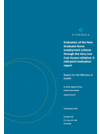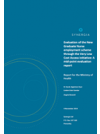This report presents the findings from the first two phases of evaluation of the new graduate nurse (NGN) employment scheme through the Very Low Cost Access (VLCA).
Report findings highlight that:
- VLCA practices receiving 12 months funding for a NGN had high or very high proportions of high need enrolees
- the initiative had helped to grow the Māori and Pacific nursing workforce
- VLCA practices were well prepared for the arrival of the NGNs and had a good induction process to support themthe NGNs had been well integrated into practices and were valued members of practice teams
- the NGNs had helped to increase time available to support patients’ social needs, staff available for appointments at the practices and performance on health targets
- all of the NGNs who responded to the survey intended to remain in primary care following the end of the initiative.
Areas for improvement noted in the report include improving the nurse entry to practice (NETP) programme to be more aligned with the learning needs of nurses in primary care, and nursing leadership support for preceptors and NGNs.
Sustainability of the NGN role at the end of the scheme and the impact on service delivery will be areas the evaluation explores in its final phases. The summative evaluation report of the NGN scheme is scheduled for completion in April 2015.
Key Results
This report has provided a useful insight into the views and experiences of key stakeholders involved in the implementation of the NGN employment scheme through the VLCA initiative.
Overall, the findings provided support for the successful implementation and initial impacts of the one-off funding for the new graduate nurse component of the VLCA Sustainability Initiative. It will be important to further validate and explore these impacts in the next phase of the evaluation.


